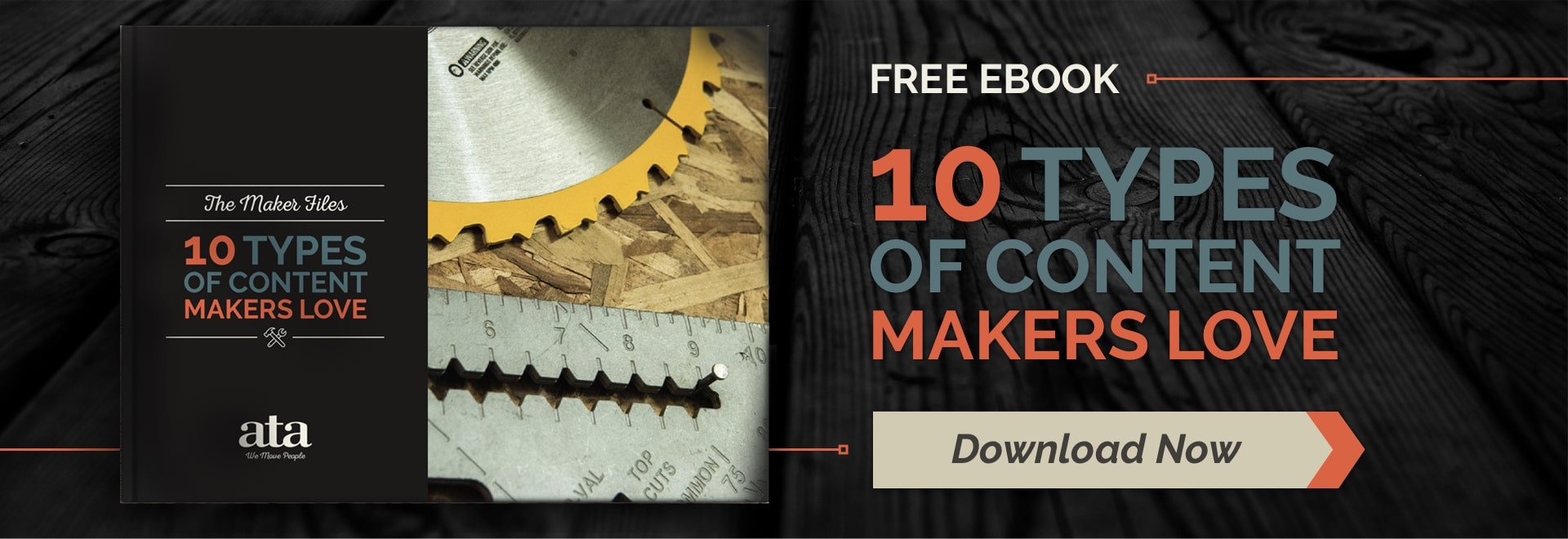When you think about the leaders you admire, what are some qualities they have in common?
We tend to admire leaders who are experienced, inspiring, and genuine. An effective leader is someone we respect, and that's why we're willing to follow their lead. The power that influential leaders have over us isn't always so positive, though. Some leaders use their power to gain obedience through fear of consequences. That's the type of leader none of us wants to work with.
In today's marketing ecosystem, expert power and its inherent respect-driven nature can play an especially impactful role in content creation and consumption. So, when you're looking to establish a leadership position for your brand, your goal should be to identify and build your brand's expert power and then figure out the best way to leverage it. To learn what expert power is and strategies for leveraging yours, read on.
What is Expert Power and Why is it Useful?
In 1959, social psychologists John French and Bertram Raven defined five different types of power that are common in most workplaces (you can find all of them here). Perhaps the strongest and most positive power is expert power.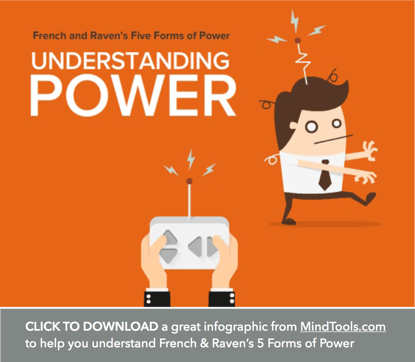
Expert power in leadership comes from your ability to demonstrate a high level of specific knowledge on a topic or a special skill that others see, want, or need. When people perceive that you have this special knowledge or skill, it compels them value your advice and influence. For instance, you would visit a doctor's office when you're sick because you don't have the medical knowledge and skills the doctor has. You're willing to follow your doctor's directions because you believe in his expert power to help you get well — something you might not have been able to do without his help.
However, it's important to note that you gain or acquire expert power from personal experience. While a formal title, position or diploma can certainly enhance a person's perception of your expert power, it's your ability to demonstrate (in practice) that you have this knowledge or expertise that ultimately communicates your expert power. Imagine if that doctor didn't ask about your symptoms or examine you before writing your prescription. How would you feel about that doctor's expert power then? It's probably safe to assume that you wouldn't go back to that doctor because he failed to show you why he's worthy of your trust, despite his PhD.
Acquiring or gaining your expert power is certainly important, but the way in which you communicate your expert power is perhaps even more important. Done poorly, it pushes people away. Done properly, it makes people more open to your expert guidance. One of the best ways to demonstrate and communicate your expert power is through the content your brand creates — particularly in an integrated inbound marketing program (our recent blog post explains how the marketing landscape has evolved to favor this strategy). Within the context of helpful, relevant content, you can demonstrate your expert power and become credible, influential and persuasive to your audience while also building your brand.
Focusing your content creation around your expert power inspires people to follow your lead in a positive way. While your content will build your search engine authority behind the scenes (i.e., improve your SEO), expert power is the authority you show to the public through the specific knowledge or skill you have that no one else does. On top of everything, your expert power doesn't just benefit you. When you share your genuine knowledge, you help others make decisions and solve problems.
To learn how to pinpoint and display your expert power, see the next section.
How to Build and Leverage Your Expert Power
While it can take years to become an expert in something (some research sets the estimate at 10,000 hours), there's a difference between building expertise and building expert power. While expertise is the actual knowledge from experience or study someone possesses, expert power is the perception of expertise gained through communication and the influence that perception holds. What all this means is that it's not simply enough to have all this knowledge — you also have to show it, and you have to show it convincingly.
Before you start plastering your walls or website with your resume, there's something else you need to know. Building expertise is something a person does over a career or a lifetime. Building expert power is something a person does simultaneously as she leverages that power in order to reach her business goals. Let me explain. Because the process of building expert power requires the crafting of a deliberate, public ethos, you're going to have to communicate information that supports that ethos. As we discussed in the previous section, your expert power shines through your content, which is intended to help the people that read it and ultimately get them to trust you. That means that every piece of content or communication you release is not only building and strengthening your expert power by showcasing your knowledge, but it's also leveraging that knowledge in order to engage with your audience. The two processes are inextricable from each other, and you should recognize that as you set content and campaign goals.
Here are some best practices to remember as you build and leverage your expert power:
- Discover Your Niche: At ATA, one of our goals is to help our
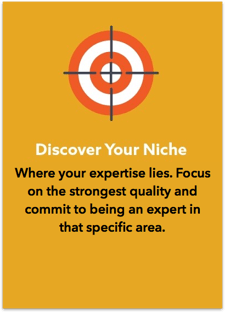 clients realize, demonstrate, and communicate their expert power, and that all starts with finding out where their expertise truly lies. This might be obvious, or it might not be. For example, if you sell healthy dog treats, you can be the dog treat expert by leveraging your knowledge of all things dog nutrition and health. Remember what we said about the doctor you trust to prescribe your medicine? You'd probably trust the person with the dog nutrition information you want or need to provide your furry friend with some healthy snacks. On the other hand, if you're in a broader business field (something like public relations, general contracting, or project management, for instance), think about your past portfolio of work before deciding where to focus your expert power. What types of products have you undertaken the most? What have you learned the most about or become the best at in your years of work? We're pretty sure you'll see trends popping up. Focus on the strongest and commit to being an expert in that specific area.
clients realize, demonstrate, and communicate their expert power, and that all starts with finding out where their expertise truly lies. This might be obvious, or it might not be. For example, if you sell healthy dog treats, you can be the dog treat expert by leveraging your knowledge of all things dog nutrition and health. Remember what we said about the doctor you trust to prescribe your medicine? You'd probably trust the person with the dog nutrition information you want or need to provide your furry friend with some healthy snacks. On the other hand, if you're in a broader business field (something like public relations, general contracting, or project management, for instance), think about your past portfolio of work before deciding where to focus your expert power. What types of products have you undertaken the most? What have you learned the most about or become the best at in your years of work? We're pretty sure you'll see trends popping up. Focus on the strongest and commit to being an expert in that specific area.
- Show Experience Through Content: Not only does your expert
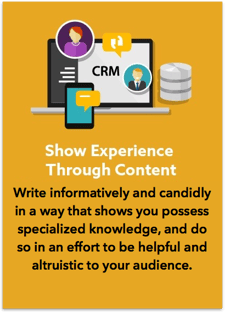 power provide you with plenty of content opportunities intricately related to your industry and target audience, but it also provides a point of reference to explain why your products or services are superior. To make your expert power public through content, remember the first rule of creative writing: show, don't tell. Boasting about your experience can come across as insincere. Instead, write informatively and candidly in a way that SHOWS you possess your specialized knowledge, and do so in an effort to be helpful and altruistic to your audience. If you TELL others to follow you because you're the best, they're less likely to form a genuine connection to your brand. Instead, SHOW your expert power in every piece of content you supply and let your audience see your value for themselves.
power provide you with plenty of content opportunities intricately related to your industry and target audience, but it also provides a point of reference to explain why your products or services are superior. To make your expert power public through content, remember the first rule of creative writing: show, don't tell. Boasting about your experience can come across as insincere. Instead, write informatively and candidly in a way that SHOWS you possess your specialized knowledge, and do so in an effort to be helpful and altruistic to your audience. If you TELL others to follow you because you're the best, they're less likely to form a genuine connection to your brand. Instead, SHOW your expert power in every piece of content you supply and let your audience see your value for themselves.
- Share Your Expertise With Your Audience: Your brand is far morethan just your products. By marketing your
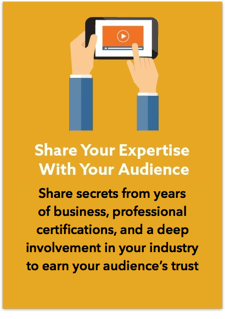 deepunderstanding of the environment surrounding yourproduct, you're providing your customer with a purchasing experience that extends beyond the physical products you sell (see our blog post on innovation in marketing to learn why that experience is so important). Your expert power is what fuels the expertise and support you offer, extending your brand into the everyday lives of your target audience. Remember, if your audience can't see your expert power, they won't know you have it. Whether your expertise comes from years of business, professional certification, a deep involvement in your industry or craft, or somewhere else, you've got to share some of your secrets to earn your audience's trust. The more genuinely helpful your content is, the more your audience will seek your advice and depend on your products.
deepunderstanding of the environment surrounding yourproduct, you're providing your customer with a purchasing experience that extends beyond the physical products you sell (see our blog post on innovation in marketing to learn why that experience is so important). Your expert power is what fuels the expertise and support you offer, extending your brand into the everyday lives of your target audience. Remember, if your audience can't see your expert power, they won't know you have it. Whether your expertise comes from years of business, professional certification, a deep involvement in your industry or craft, or somewhere else, you've got to share some of your secrets to earn your audience's trust. The more genuinely helpful your content is, the more your audience will seek your advice and depend on your products.
- Stay Updated: You could have years of experienceor a
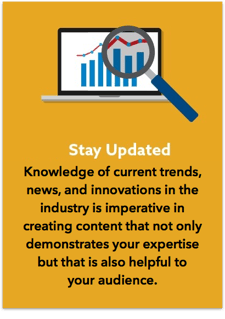 deeplystudied knowledge of any particular industry there is, but if yourknowledge doesn't pertain to the modern state of the art, your expert power isn't so powerful after all. To make your expert power work for you, you not only need to demonstrate yourbackground that made you into an expert. On top of that, your knowledge of current trends, news, and innovations in the industry is imperative in creating content that is actually helpful for your audience. You'll lose credibility the more outdated your information is, so stay up-to-date to preserve the value of your expert power.
deeplystudied knowledge of any particular industry there is, but if yourknowledge doesn't pertain to the modern state of the art, your expert power isn't so powerful after all. To make your expert power work for you, you not only need to demonstrate yourbackground that made you into an expert. On top of that, your knowledge of current trends, news, and innovations in the industry is imperative in creating content that is actually helpful for your audience. You'll lose credibility the more outdated your information is, so stay up-to-date to preserve the value of your expert power.
How a Few Brands Use Their Expert Power
To illustrate what expert power looks like in real life, we'll start by examining how large-scale influencers use theirs to stay on top.
Neil deGrasse Tyson
Neil deGrasse Tyson, by usual standards, should not be a household name. Even if they win a Nobel Prize, astrophysicists don't normally achieve celebrity status. Perhaps it's because an astrophysicist's work and research is so extensive that it doesn't seem to touch our everyday lives as much as, for instance, the stories we see on the news. Tyson changed all that when he rebooted Carl Sagan's 1980 PBS series "Cosmos: A Personal Voyage," establishing his expert power over the biggest concepts and questions about our universe. .jpg?width=353&name=Neil_deGrasse_Tyson_at_Howard_University_September_28%2c_2010_(cropped_to_shoulders).jpg)
Since long before the reboot, however, Tyson has been revered for his knowledge in the field of astrophysics. Of course, his background in the field starts with a list of college degrees from Harvard, Columbia, and more. He went on to lecture and research at the University of Maryland and at Princeton before becoming the director of the Hayden Planetarium at the American Museum of Natural History. Tyson's own expert power is augmented by his notable work in astronomy, physics, and more at these authoritative institutions. In a similar way, his reboot of "Cosmos" borrows authority from the original program to which is is a sequel.
Audiences don't just revere Tyson because he's educated, however. They come back to him with questions and a hunger to learn more because he is an educator, and an inspiring one at that. Tyson is never boring or stuffy (check out his killer wardrobe, if you need some proof), and he approaches the monumental topics of space, the universe, and the progress of the human race by turning them into bite-sized pieces that any audience member, regardless of their familiarity with physics, can chew. He uses accessible pop-culture references to illustrate scientific concepts in "Cosmos", in interviews, and in tweets, like this one:

He's a teacher with a zest for sharing his expert power in a way that all people can understand.
Finally, Tyson leverages his expert power as attainable in a plethora of different types of media and levels of involvement. While "Cosmos" is perhaps Tyson's most generally popular content offering, he has also written columns, articles, and books on space and more. He hosts the StarTalk podcast, which is a mashup of science, pop-culture, and comedic antics along with celebrity and scientist co-hosts. Tyson has made appearances on numerous television shows, playing roles from himself to a very intelligent, animated pig in Disney's Gravity Falls. His opinion is sought in interviews from major news networks and talk shows like The Daily Show. Just about anyone would love the chance to work with Tyson, and that's a true testament to admiration his expert power has inspired.
Kodak
Kodak is an industry giant in photography and printing and has been for many years. 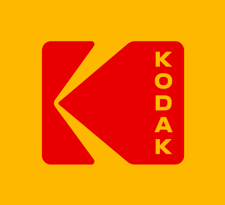 The company's
The company's
long history is a huge part of its expert power. Kodak has survived countless industry revolutions and societal changes since putting the first point and shoot camera in the hands of everyday consumers in 1888. That's the kind of company people believe knows what it's doing.
If you take a look at Kodak's website and social media (even their Google Search result), it's plain to see that Kodak values science, art, technology, and innovation as well as its historical roots in the camera industry. The information Kodak shares about its innovation projects serves as pretty decent proof that the company is on the cutting edge of its field. So, Kodak draws expert power from its specialized knowledge of photography and uses that knowledge to develop new technology that responds to create solutions. That's one way to really leverage expert power — sharing your technical knowledge and being  transparent about projects you're working on that will help your customers solve their problems. That's a strategy likely to win and retain a lot of customer loyalty.
transparent about projects you're working on that will help your customers solve their problems. That's a strategy likely to win and retain a lot of customer loyalty.
Finally, Kodak's blog and educational resources position the brand's expert power in a way that is accessible to both its potential customers and current users. Kodak has proved it has the knowledge its 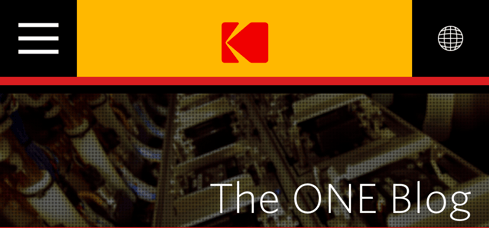 audience wants, and now the company uses its blog to share that information to help others who want its advice. A tribute to founder George Eastman, interviews with current filmmakers, and rundowns on current events in the printing world are just a few of Kodak's most recent blog post topics, and they all serve to demonstrate Kodak's understanding of the current world of photography and print (sounds like something we talked about in the previous section of this post, right?). In sum, Kodak's content demonstrates its expert power in a way that both attracts potential customers and engages with existing audiences alike.
audience wants, and now the company uses its blog to share that information to help others who want its advice. A tribute to founder George Eastman, interviews with current filmmakers, and rundowns on current events in the printing world are just a few of Kodak's most recent blog post topics, and they all serve to demonstrate Kodak's understanding of the current world of photography and print (sounds like something we talked about in the previous section of this post, right?). In sum, Kodak's content demonstrates its expert power in a way that both attracts potential customers and engages with existing audiences alike.
Shifting gears a bit, I'd like to look at one more example of expert power, but this time on a smaller, less mainstream scale.
Grammar Girl
Mignon Fogerty is better known by her alias Grammar Girl on the how-to/advice site 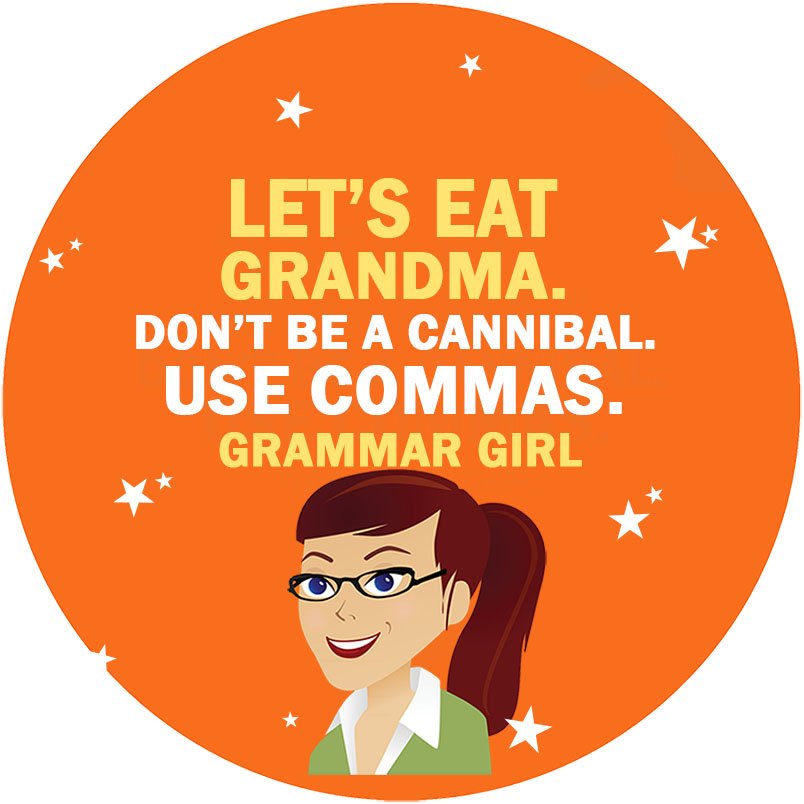 quickanddirtytips.com. Grammar Girl creates an array of content from blog posts to e-books to a highly revered podcast, all to achieve one goal: teaching the everyday writer tips for remembering tricky grammar rules. She answers specific grammar questions that are typically difficult to search the internet for directly, meaning that instead of a broad answer about homophones, her readers know exactly when to use "hearty" vs. "hardy." Upon first glance of her homepage, the right sidebar clearly presents a component of Grammar Girl's expert power: her education, work experience, and awards. Besides giving you insight into the girl behind the blogs, Grammar Girl's credentials serve as an indication of why she is qualified to give spelling, punctuation, and usage advice. Grammar Girl also gains credibility through her association with other experts on the site. While this resume alone is not enough to substantiate expert power, Grammar Girl's bio does a lot to prove she has experience to back up the expert power she exhibits.
quickanddirtytips.com. Grammar Girl creates an array of content from blog posts to e-books to a highly revered podcast, all to achieve one goal: teaching the everyday writer tips for remembering tricky grammar rules. She answers specific grammar questions that are typically difficult to search the internet for directly, meaning that instead of a broad answer about homophones, her readers know exactly when to use "hearty" vs. "hardy." Upon first glance of her homepage, the right sidebar clearly presents a component of Grammar Girl's expert power: her education, work experience, and awards. Besides giving you insight into the girl behind the blogs, Grammar Girl's credentials serve as an indication of why she is qualified to give spelling, punctuation, and usage advice. Grammar Girl also gains credibility through her association with other experts on the site. While this resume alone is not enough to substantiate expert power, Grammar Girl's bio does a lot to prove she has experience to back up the expert power she exhibits.
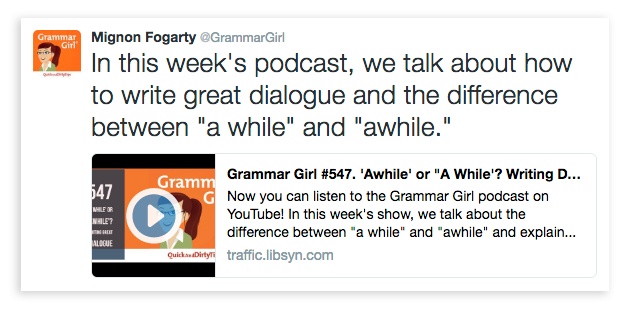
Grammar Girl's "quick and dirty tips" are fueled both by questions submitted by readers and listeners and by current events relevant to a common grammar mistake (ever been confused as to whether it's Bridget Jones's Baby or Bridget Jones' Baby?). Grammar Girl, then, is leveraging her expert power by writing about topics that her audience cares about and would relate to. She puts her grammar expertise into an everyday context that's easy for her readers to grasp, and that's what's earned her their loyalty. A key to Grammar Girl's appeal is that she approaches grammar with absolutely no snobbery but instead with a sincere mission to make grammar friendly and accessible to all.
Find Your Own Expert Power
You want attract and retain a loyal audience? (That's why you're reading a marketing blog, right?) Find your expert power and leverage it. While your organization may be in the business of selling specific products or services, your ability to harness and leverage your expert power about a broader topic related to your product/service can determine your place in your industry and your ability to influence your target audience. Utilizing awesome content to demonstrate your expert power to genuinely help your potential customers solve the problems they face will help you establish a more authentic connection. You'll earn their respect and willingness to accept your opinions and influence, and the best thing is, your audience is hungry for the specialized knowledge that you can offer (and remember: if you don't offer it, someone else will).